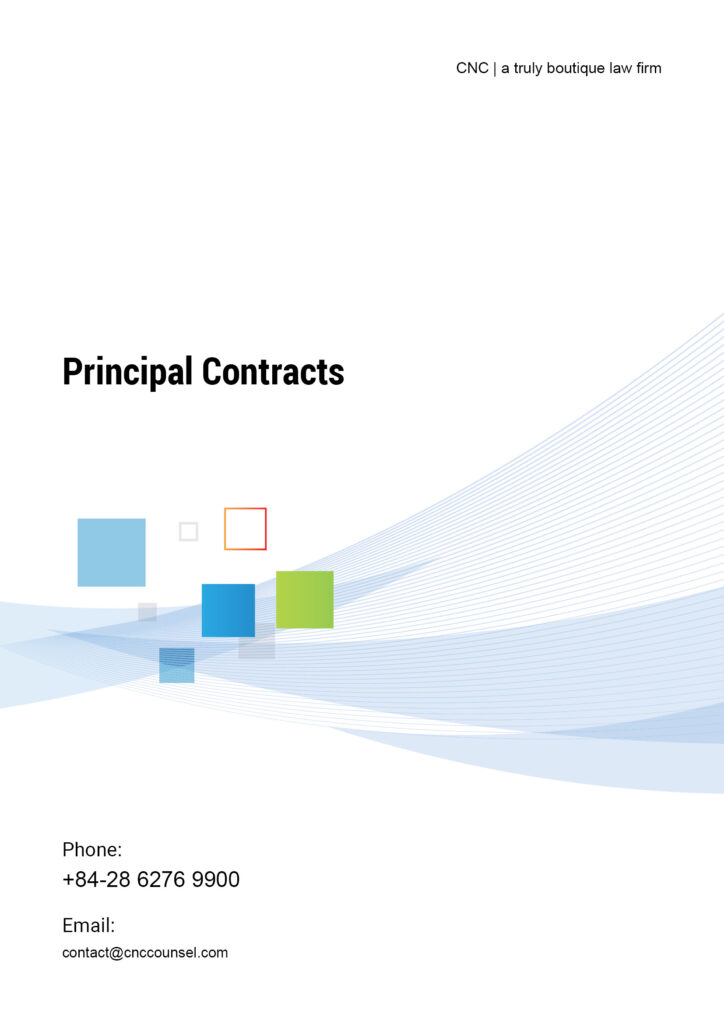Principal Contracts
What are principal contracts?
Current legislation does not provide an official definition of a Principal Contract. However, based on the definition of a Principle Construction Contractor in clause 35, Article 3, Law on Construction (amended and supplemented in 2020), a Principle Contract can be understood as a contract signed directly between the Employer and the Contractor, whereby the Contractor undertakes all or part of the work of a Project.
A Principal Construction Contractor typically assumes full responsibility from the design phase to the construction of the project. However, the definition of a Principal Contract under the Law on Construction does not clearly address whether the Contractor may also undertake design and technology transfer work.
In other words, users must distinguish Principal Contracts from other types of contracts, such as EPC Contracts or Design-Build Contracts.
Furthermore, clause 2, Article 141, Law on Construction 2014 (amended and supplemented in 2020) also mandates that a Principal Contract must include the management contents and responsibilities of the Principal Contractor. This indicates that the definition of a Principal Contract under the Law on Construction emphasizes the role of the Principal Contractor in managing and coordinating different packages and tasks of the Project, rather than focusing on the complexity of individual tasks.
As a result, Principal Contractors typically do not carry out all the work themselves under the Principal Contract, but rather subcontract part or even all of the work to Subcontractors through Subcontracts.
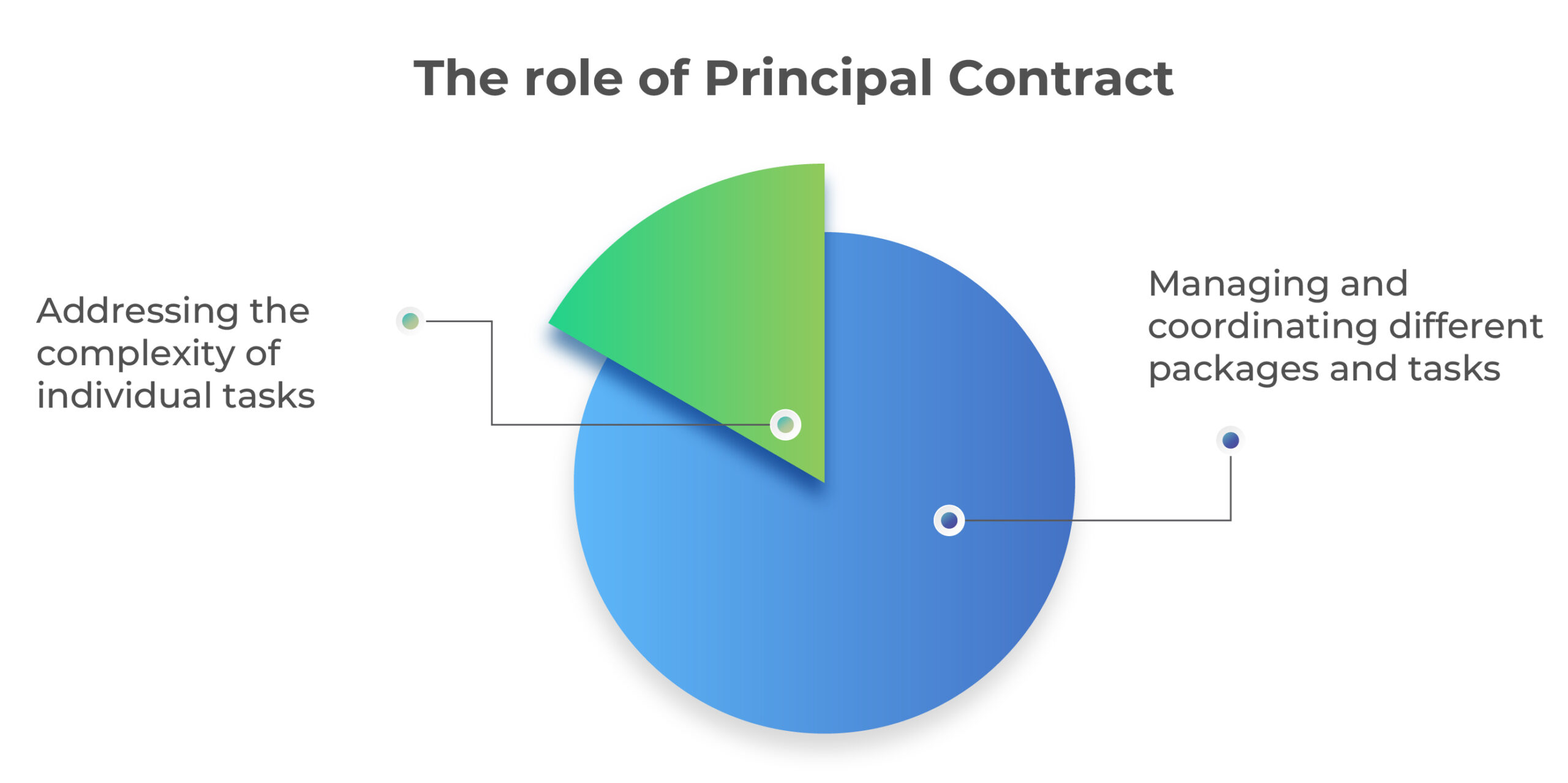
The role of Principal Contract
Types of Principal Contracts
A Principal Contractor could undertake at least one of the following tasks in a Project: project formulation, design, procurement of technological equipment, and construction of the works. Based on that, Principal Contracts can be classified according to the scope of work undertaken by the Principal Contractor:
- Design Contracts
- Construction Contracts
- Design – Build Contracts
- Engineering, Procurement, and Construction Contracts (or EPC Contracts)
- Turnkey contracts
Accordingly, the Principal Contractor shall undertake the most works in cases where turnkey contracts are applied, which include project formulation, design, procurement of technological equipment, and construction of the works. The Principal Contractor in Turnkey Contracts is also referred to as the Project Manager
The volume of works then gradually reduced in EPC Contracts, Design-Build Contracts and Design/Construction Contracts.
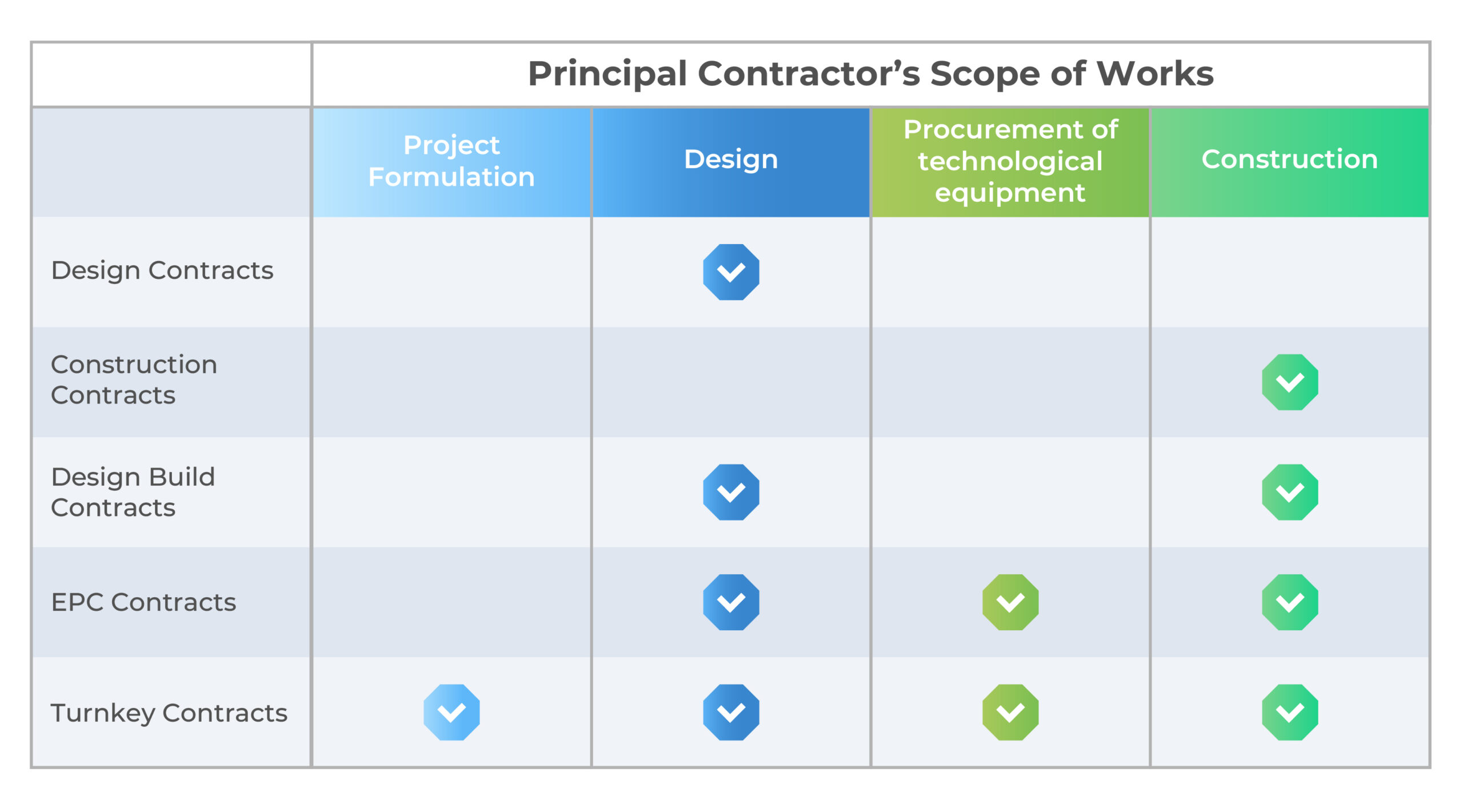
Differentiate types of Principal Contracts
Benefits of Principal Contracts
A Principal Contract could be considered a suitable option for Employers who lack extensive experience in construction and project management. Accordingly, the Employer transfers most of the project management risks to the Principal Contractor, who then applies their technical expertise and project management experience to implement the Project’s tasks.
With this approach, the Employer minimizes project management risks, thereby reducing the likelihood of resource waste, capital loss, and weak control and oversight of work quality.
Flaws of Principal Contracts
In exchange for reduced project management risks, project management costs will increase, which results in Principal Contracts generally cost more than other construction contracts.
At the same time, under a Principle Contract, the Employer does not have direct control over the Contractor during the project implementation. This can severely affect the Project if the Contractor lacks sufficient capacity and expertise to carry out the work.
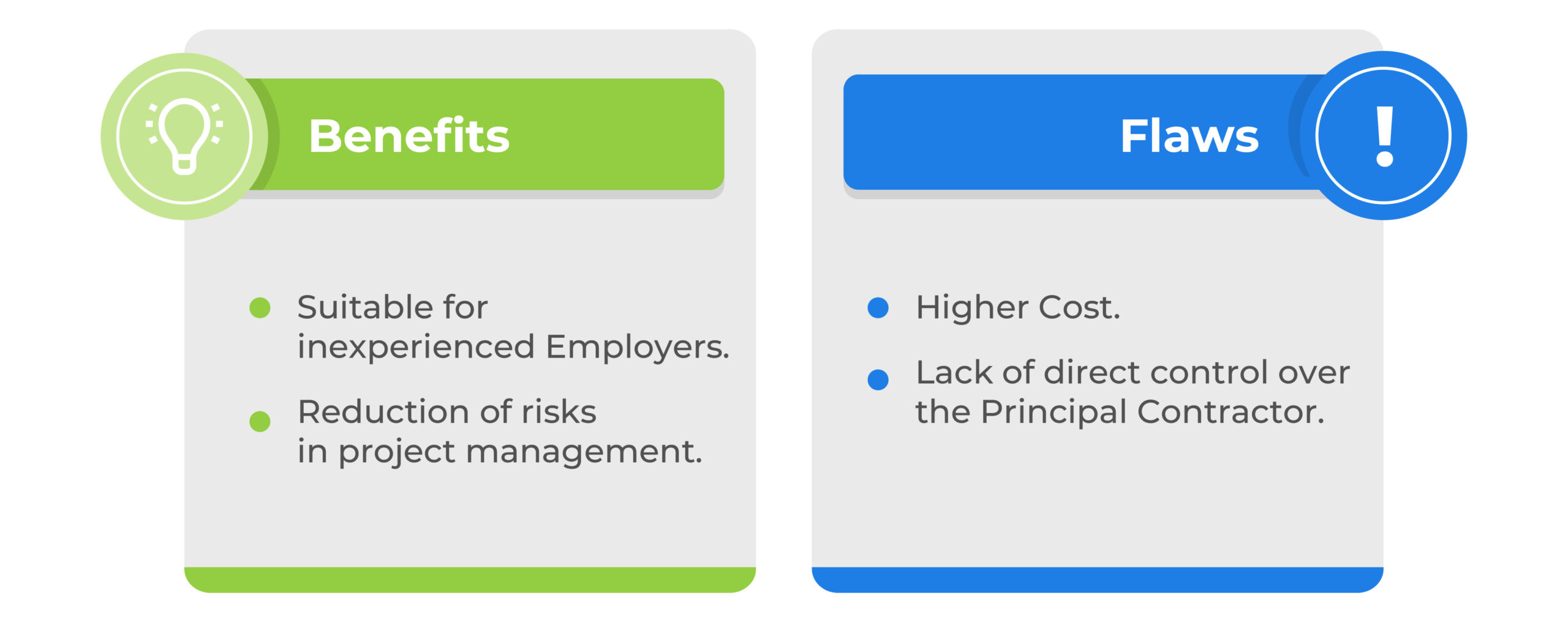
Benefits and flaws of Principal Contracts
Requirements for Principal Contractors
Any Contractor participating in a Project as the Principal Contractor must have a team of experts and personnel with the necessary competence and professional experience relevant to their role in the Project.
Competence must be demonstrated through capacity certificates and/or professional practice certificates in accordance with construction law. As for professional experience, the Principal Contractor must provide proof through previously executed contract packages and projects.
Issues related to capacity and expertise will be reviewed and evaluated during the project bidding process.
In addition, Principal Contractors supplying materials and equipment must ensure the quality of the machinery, materials, and equipment they provide.
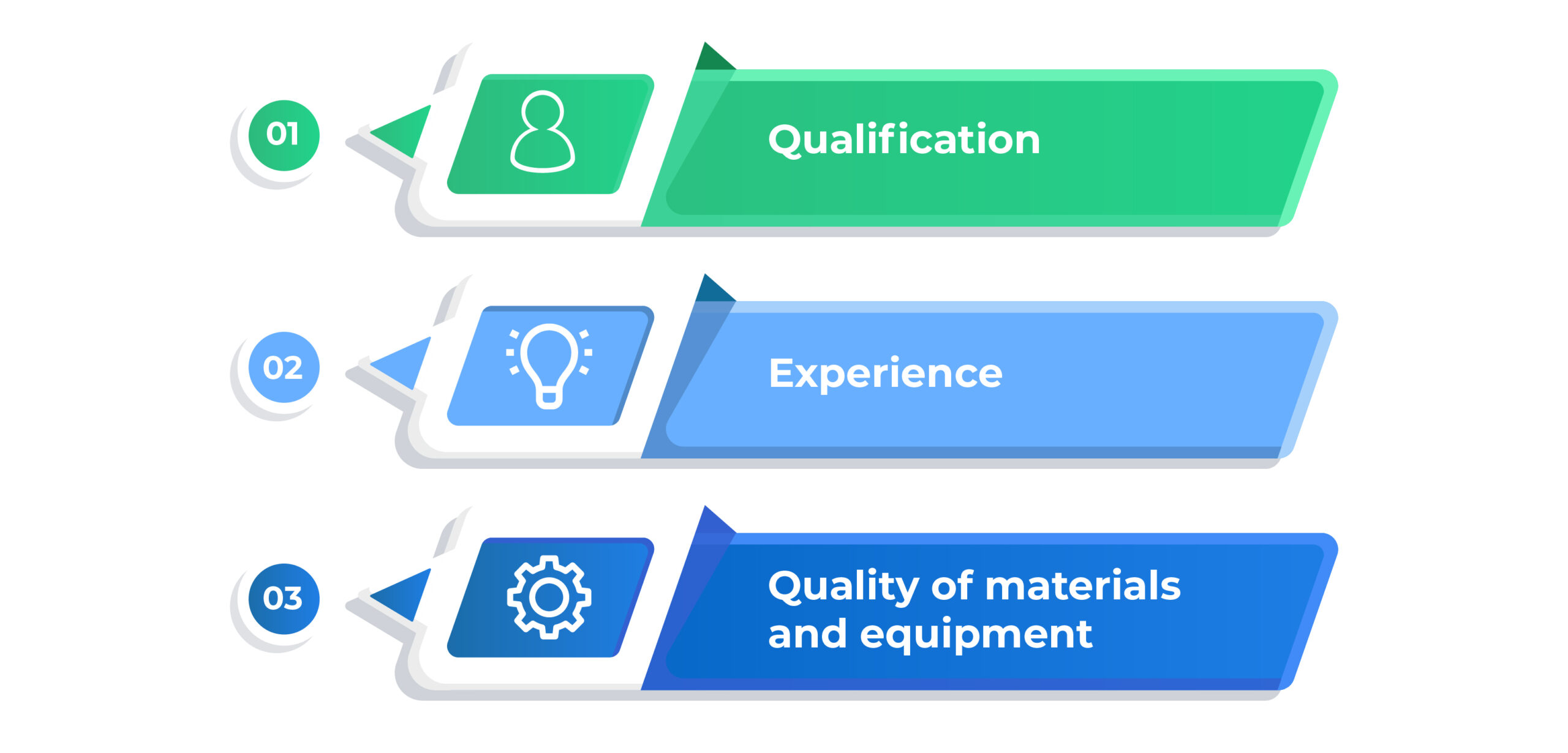
Requirements for Principal Contractors
Principal Contract Templates
For context, CNC shall introduce Clients to the Principal Contract Templates promulgated by the Ministry of Construction
However, it should be noted that Principal Contract is a general concept for a group of construction contracts. Therefore, users should not mistake this concept with those of EPC Contracts or Design – Build Contracts
Contact
In the construction sector, CNC is proud to be the sole partner trusted by clients for its professionalism, credibility, and the extensive experience it has accumulated.
In Vietnam, CNC is proud to be the pioneering law firm solely dedicated to developing legal services related to Principal Contracts, such as specialized Construction Contract Counsel Services and Construction Contract Management Services.
These two services have shaped CNC’s reputation and brand in the legal market, contributing to the success of numerous projects.
Contact CNC now if you need legal consulting, contract negotiation, or preparation for any Construction Contract.
CNC’s lawyers are proud to be experts in construction contract templates issued by the Ministry of Construction, FIDIC, and NEC. Their fluency in Vietnamese, English, and Chinese gives CNC’s lawyers a significant advantage for clients.
CNC Vietnam Law Firm Co., Ltd
28 Mai Chi Tho, An Phu Ward, Thu Duc City, Ho Chi Minh City, Vietnam
Phone: 028 6276 9900 | Hotline: 0916 545 618
Email: contact@cnccounsel.com | Website: http://cnccounsel.com
Facebook: https://facebook.com/cnclaw/
Linked: https://linkedin.com/company/cnccounsel



